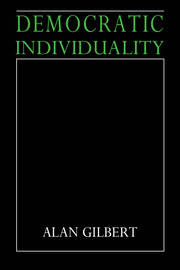Book contents
- Frontmatter
- Contents
- Preface
- Introduction
- Part I THE THEORY OF POLITICAL FREEDOM AND INDIVIDUALITY: SLAVERY, MUTUAL REGARD, AND MODERN EGALITARIANISM
- 1 A common good and justice in war
- 2 The capacity for moral personality and the ambiguities of liberalism
- 3 Empiricism, neo-Kantianism, and realism in science and ethics
- 4 Neo-Kantianism and moral realism
- PART II DEMOCRACY AND INDIVIDUALITY IN MODERN SOCIAL THEORY
- Conclusion: the project of democratic individuality
- Bibliography
- Index
2 - The capacity for moral personality and the ambiguities of liberalism
Published online by Cambridge University Press: 05 June 2012
- Frontmatter
- Contents
- Preface
- Introduction
- Part I THE THEORY OF POLITICAL FREEDOM AND INDIVIDUALITY: SLAVERY, MUTUAL REGARD, AND MODERN EGALITARIANISM
- 1 A common good and justice in war
- 2 The capacity for moral personality and the ambiguities of liberalism
- 3 Empiricism, neo-Kantianism, and realism in science and ethics
- 4 Neo-Kantianism and moral realism
- PART II DEMOCRACY AND INDIVIDUALITY IN MODERN SOCIAL THEORY
- Conclusion: the project of democratic individuality
- Bibliography
- Index
Summary
Six criticisms of moral objectivity
The preceding chapter's analysis of Aristotle, Montesquieu, Hegel, and Marx on a common good and just war stresses (limited) objectivity and progress in political theory and ethics. Several generations of liberal and radical political philosophers have, however, rejected even a minimal notion of objectivity, let alone moral realism. This chapter will explore how the adoption of epistemological relativism by major liberal theorists undermines their central claims about the general capacity for moral personality. Such conventionalist views rest on important misunderstandings about the scope of moral realism, which I will seek to clear up. They also suggest six criticisms of objectivity:
1. The objectivity as absolutism argument: a sweeping requirement that a moral philosophy, to be objective, must lead to clear decisions across the board. This critic claims that a notion of objectivity can countenance no areas of vagueness, borderline or hard cases, but requires bivalence (every moral question must have a true or false response).
2. The diversity of moral meanings argument: a related notion that any historical variation or contemporary transsocietal failure of uniformity in moral standards cancels objectivity.
3. The conflict of goods argument: the idea that frequent conflicts among major human goods rule out objectivity.
4. The nonexistence of moral facts and moral explanations argument: a denial that historical discovery in ethics – broadly comparable to discoveries in other branches of knowledge – can occur.
[…]
- Type
- Chapter
- Information
- Democratic Individuality , pp. 70 - 107Publisher: Cambridge University PressPrint publication year: 1990



